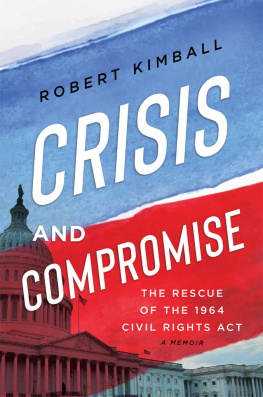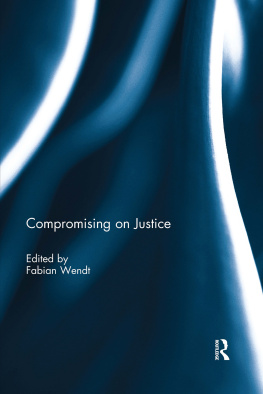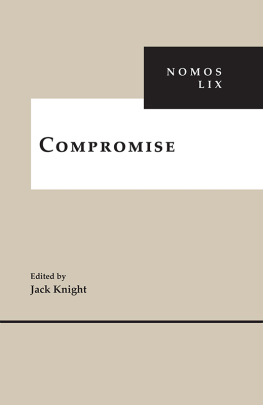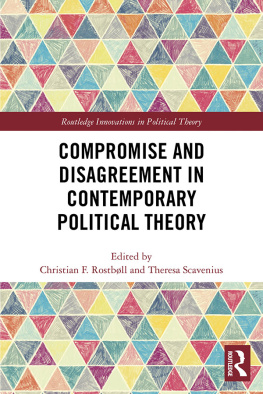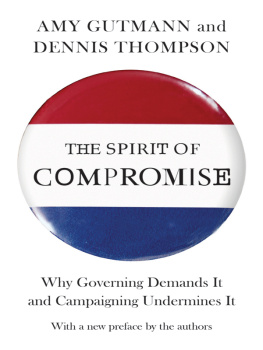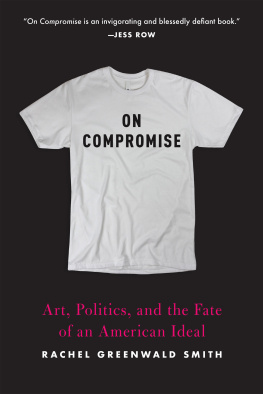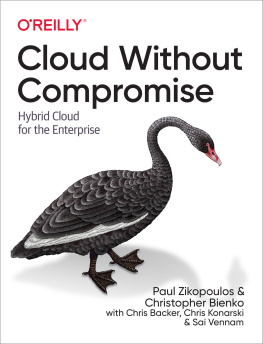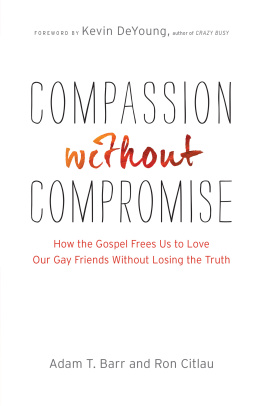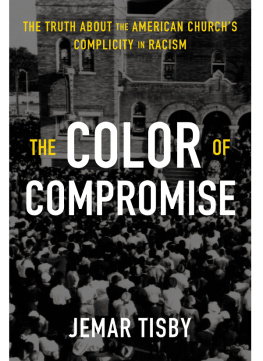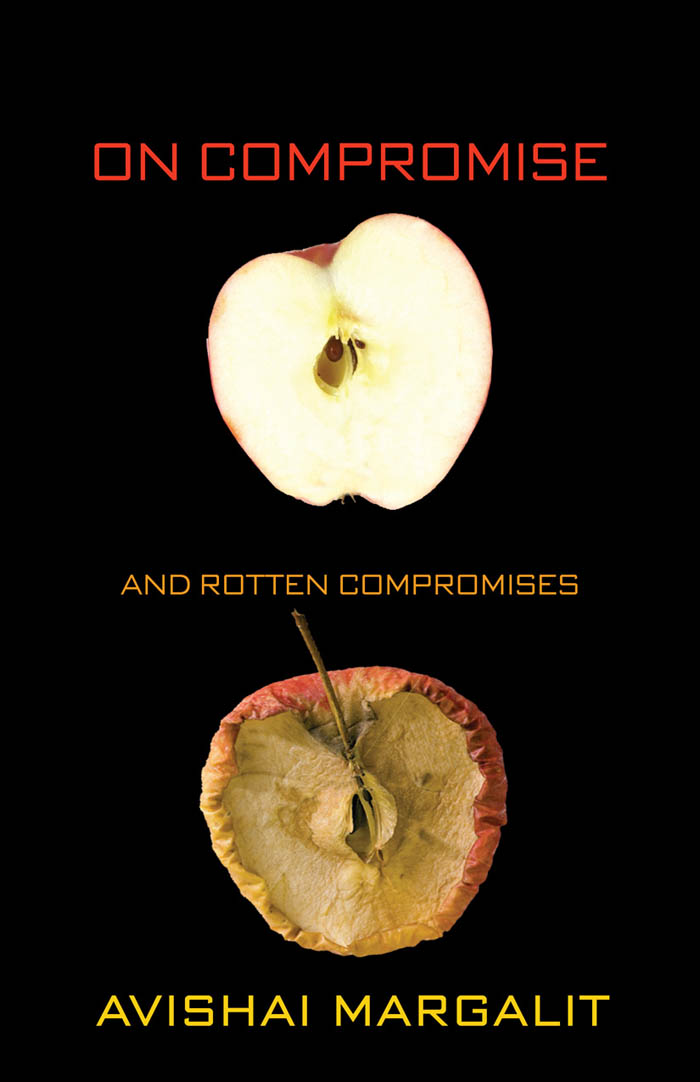ON COMPROMISE
AND ROTTEN COMPROMISES
ON COMPROMISE
AND ROTTEN COMPROMISES

AVISHAI MARGALIT
PRINCETON UNIVERSITY PRESS
PRINCETON AND OXFORD
Copyright 2010 by Princeton University Press
Published by Princeton University Press, 41 William Street,
Princeton, New Jersey 08540
In the United Kingdom: Princeton University Press, 6 Oxford Street,
Woodstock, Oxfordshire OX20 1TW
A LL R IGHTS R ESERVED
Library of Congress Cataloging-in-Publication Data
Margalit, Avishai, 1939
On compromise and rotten compromises / Avishai Margalit.
p. cm.
Includes bibliographical references (p. ) and index.
ISBN 978-0-691-13317-1 (hardcover : alk. paper) 1. Compromise (Ethics)
2. Political sciencePhilosophy. I. Title.
BJ1431.M28 2009
170dc22
2009011807
British Library Cataloging-in-Publication Data is available
This book has been composed in Minion typeface
Printed on acid-free paper.
press.princeton.edu
Printed in the United States of America
1 3 5 7 9 10 8 6 4 2
In memory of my parents,
Miriam and Moshe

CONTENTS

INTRODUCTION
Why compromise?
-1
Two Pictures of Political Compromise
-2
Varieties of Compromise
-3
Compromising for Peace
-4
Compromise and Political Necessity
-5
The Morality of Rotten Compromises
-6
Sectarianism and Compromise
CONCLUSION
Between Evil and Radical Evil
ACKNOWLEDGMENTS

I DELIVERED TWO Tanner lectures at Stanford University in 2005. The themes of these lectures are the basis of chapters 1 and 3. The lectures were closely scrutinized by four exceptionally powerful commentators from varied fields of learning: John Ferjohn, Lee Ross, Samuel Scheffler, and Tamar Schapiro. I was also very lucky to receive highly searching comments from Kenneth Arrow, Moshe Halbertal, and Amelie Rorty, who read the Tanner lectures and wrote detailed comments. Edna Ullmann-Margalit read the entire manuscript, and her contribution, as always, is invaluable.
I thank Mike Borns, Julia Bernheim, and Lauren Lepow for helping me at various stages in matters of language and style.
I am to be blamed for the shortcomings of the book, but without the help I received, there would have been many more.
ON COMPROMISE
AND ROTTEN COMPROMISES
INTRODUCTION
W HY C OMPROMISE ?
The Concern
A LBERT E INSTEIN is credited with the warning Beware of rotten compromises. My book is an effort to explain and support this warning.
But the book is about much more. It is about peace and compromise.
More specially: what compromises we are not allowed to make for the sake of peace.
The short answer is: rotten compromises are not allowed, even for the sake of peace. Other compromises should be dealt with on a retail basis, one by one: they should be judged on their merit. Only rotten compromises should be ruled out on a wholesale basis. Even though the book is about compromises that we should avoid, come what may, its main goal is to leave the widest (morally) possible room for compromises made for the sake of peace, including cases in which peace is achieved at the expense of justice. The book is in pursuit of just a peace, rather than of a just peace. Peace can be justified without being just.
This is not an easy claim to make, but this is the claim I am making.
The compromises discussed in the book are political compromises, rather than personal ones. The distinction is not always clear. Some personal deals have immense political or, more to the point, Oppenheimers being in charge of doing physics on a grand scale. Whatever the real details of Oppenheimers Faustian pact are, the political implication of the atomic bomb is as obvious as its mushroom cloud.
I see a rotten political compromise as an agreement to establish or maintain an inhuman regime, a regime of cruelty and humiliation, that is, a regime that does not treat humans as humans. Throughout the book I use inhuman to denote extreme manifestations of not treating humans as humans. Inhuman in the sense of cruel, savage, and barbarous behavior conveys only one element of inhuman as I use the word; humiliation is another element. Humiliation, as I see it, is already not treating humans as humans, but humiliation intensified by cruelty equals inhuman. So a fusion of cruelty and humiliation is what an inhuman regime consists of.
The idea of an inhuman regime, a regime of cruelty and humiliation, guides my understanding of rotten compromises. The basic claim is that we should beware of agreeing, even passively, to establish or maintain a regime of cruelty and humiliationin short, an inhuman regime.
Many bad things popped out of Pandoras box, and choosing inhuman regimes as the bad thing to avoid at all costs calls for justification.
Inhuman regimes erode the foundation of morality. Morality rests on treating humans as humans; not treating humans as humans undermines the basic assumption of morality. I draw a distinction between morality and ethics. Morality is about how human relations should be in virtue of our being human and in virtue of nothing else.
Ethics, in contrast, is about what relations we should have with other people in virtue of some special relationships we have with them, such as family relations or friendship.
Morality, by its very nature, is based on the category of belonging to humanity, in the sense of belonging to the human species. The assault on humanity inflicted when humans are treated as nonhumans undermines the very project of morality, the project of constituting human relations as they should be.
For the sake of defending morality we end up with a stern injunction: rotten compromise must be avoided, come what may. But what does the come what may come to? are meant to answer this question. The upshot is that the come what may should be taken quite literally.
Let me stress again, the book contains stern warnings against rotten compromises, yet its aim is to provide strong advocacy for compromises in general, and compromises for the sake of peace in particular. It limits wholesale prohibitions on compromises to the bare minimum. Limiting wholesale prohibitions to the bare minimum does not mean that all compromises are justified. There might be good reasons to reject a particular compromise on the ground that it is unfair, unreasonable, or untimely. Selling Manhattan (in 1624) for merchandise worth 60 guilders was not a terribly good idea for the Native Americans involved, nor, for that matter, was the selling of Alaska by the Russians (in 1867) for 7.2 million dollars.
I do not subscribe to the adage A lean compromise is better than a fat lawsuit.beads and buttons, for true valuables), or shabby deals (exploitative ones, taking advantage of the vulnerability of the weak party). These are all forms of morally bad deals, yet given the alternatives, they might on occasion be justified. Rotten compromises are different. They are never justified; at best, they may be excused.
Rotten compromises usually are at the heart of darkness. Extreme forms of racist regimes are the epitome of not treating humans as humans, and constitute a direct affront to the assumption of shared humanity. A compromise to establish or maintain racist regimes is the epitome of rottenness.



